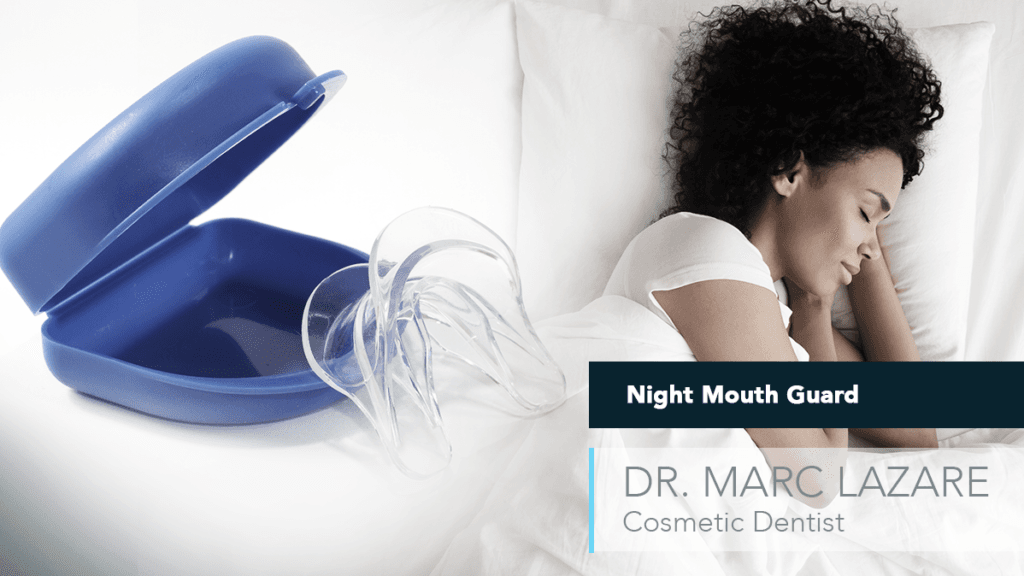Night Mouth Guards are a common and effective way to help protect the teeth from nighttime grinding and keep them from becoming damaged. Dr. Marc Lazare offers patients high-quality Night Mouth Guards in New York City, NY, to help patients preserve their teeth and live in comfort.
Sometimes, we take our teeth for granted. Our smile is one of our greatest assets, but we often don’t care for our teeth as diligently as we should. In fact, we often end up needing dental work due to decaying or weakened teeth. It’s not just poor brushing and flossing that can cause problems, however. Many people grind their teeth, for example, especially at night. Our jaw exerts tremendous force on the teeth, which can cause damage to them over time.
 What is a Night Mouth Guard?
What is a Night Mouth Guard?
A night mouth guard is a device that is fitted over the teeth to help protect them from the forces of clenching and grinding during sleep.
Also known as occlusal splints, bite guards, and muscle relaxation appliances, these simple devices can protect the enamel and the teeth from becoming worn away, cracked, and broken over time. Bruxism (grinding the teeth) can also cause sensitivity, pain, yellowing, and even receding gums.
During the day, it’s possible to monitor tooth grinding, but at night while you’re asleep, you can’t always prevent yourself from clenching and grinding.
A night guard can prevent some of the potential damage caused by nighttime grinding. Guards can also help alleviate TMD, a dysfunction of the TMJ.
Why Use a Night Mouth Guard?
Your natural teeth can last a lifetime if you care for them properly. Aside from proper brushing and flossing and regular dental visits, caring for your smile includes ensuring that you do not wear down your teeth or allow them to become loose from clenching and grinding. Since you’re most often asleep when grinding happens, most people are not even aware of it. A night mouth guard is the first line of defense against damage to the teeth.
Night mouth guards can also help reduce or eliminate morning headaches and sore jaws, and they can help reduce tooth sensitivity from bruxism. They can help relax your jaw muscles, which can reduce spasms if you have them. Most importantly, the night guard takes the brunt of the wear and tear caused by grinding, rather than your teeth. Dental work can be very expensive and uncomfortable, and while there are good options for repair and replacement, preventing damage to your natural teeth is the best way to ensure a healthy smile for years to come. A night guard can play a simple but crucial role in this effort.
 Could a Night Mouth Guard Help You?
Could a Night Mouth Guard Help You?
If you wake up in the morning with a headache, an aching jaw, and sensitive teeth, then you probably have trouble with clenching and grinding.
Bruxism and TMJ disorder are two conditions that often warrant the use of a night mouthguard. However, it’s important to get an expert dentist's opinion before you decide whether or not to use a night mouthguard.
You may not know whether you grind your teeth or not, since it happens overnight, but your dentist will be able to see any damage to the enamel or other issues caused by grinding. It’s a very common problem, and many people can benefit from using a night mouth guard.
Night mouth guards are simple to use and most people have no problem sleeping with one on after an adjustment period.
Your Night Mouth Guard
If you are a good candidate for a night mouth guard, your next step is to discuss your options with your dentist. Most night guards are fitted for the upper teeth since this tends to provide the most benefit to patients. However, there are some special circumstances that can make a lower guard make more sense. Your guard will be fitted and molded to your teeth for your comfort and to prevent changes in your bite. It is important to use a high-quality night mouth guard, as a low-quality substitute will not protect the teeth well. Your dentist will be able to advise you and help you make the right decision for your situation.
FAQ
How do I keep my night mouth guard clean?
Every day, you should rinse and brush your mouthguard thoroughly, allowing it to dry completely. It should be stored in a case to prevent warping. On a weekly basis, you should deep clean the guard with a denture cleaner or other acrylic cleaners to ensure that it stays sanitary and lasts as long as possible.
Are night mouth guards one size fits all?
No. Night mouth guards can be uncomfortable and ineffective unless they are fitted and custom-molded to the teeth. Bulky over-the-counter night dental guards and boil guards are not typically recommended as they do not offer the same benefits as a high-quality dental night dental guard and some cheaper versions may actually cause more harm than good.
How long do mouth guards last?
The longevity of your night mouth guard will depend on several factors, including the material and thickness of the guard (some are soft and some are rigid, depending on the extent of the bruxism), your symptoms, and severity of clenching and grinding, and the quality of the guard. Some guards last only months, while others can last between 5 to 10 years. No night guard will last forever, unfortunately, and will eventually need to be replaced. However, this is far preferable to replacing your teeth! Discuss with your dental professional which mouth guard works best.
Should children use night guards?
Many children, like adults, grind their teeth. Some outgrow the habit before they become teenagers, while others do not. Nightguards are not often prescribed for children, but your dentist may recommend one depending on the situation. It is also helpful to reduce stress and anxiety as much as possible to help prevent children from grinding and clenching at night.
If I have dental implants, could I benefit from a night mouthguard?
Yes! Once you’ve invested in expensive dental work like implants, you’ll want to protect both your investment and your smile. Using a night guard can help prevent damage to dental work like dental implants, fillings, and crowns.
Should I wear night mouth guards on my upper or lower teeth?
Night Guard for Bottom Teeth
Between both upper or lower night guards, the best results come from using a night guard for bottom teeth. People also find that these particular night guards are more comfortable and are a better fit. Night guards for bottom teeth are also less likely to trigger a gag reflex.
Night Guard for Top Teeth
However, some patients may have a specific preference or need to protect porcelain veneers or other dental work on the top arch. In these cases, an upper guard might be a better option. If unsure, you can discuss with your dental professional the benefits better suited for you and night guards for your top or bottom teeth.
Will I need to use a night mouthguard forever?
The answer depends on the person and the cause of the clenching and grinding. If you grind your teeth, it may have to do with stress and anxiety in your life. If these problems subside, you may not need to use the night guard as much. However, it’s impossible to tell on your own, and unless your dentist says otherwise, it is usually better to continue wearing a night dental guard to protect your teeth.
What are the risks of wearing Night Mouthguards?
Low-quality or poorly-fitted night guards can affect the bite and even cause problems like TMJ to worsen. However, working with a skilled dentist and getting a properly fitted nightguard should not cause any problems or discomfort. According to recent studies, mouth guards can be the breeding ground for life-threatening bacteria, yeast, and mold.
Is it ever a good idea to wear a guard during the day?
Some people do grind their teeth during the day and might benefit from wearing a guard during the day. Your dentist will be able to advise you on whether this is a good idea for you.
Do I really need a night mouthguard?
Many people are resistant to getting a night mouth guard. They think they don’t need it or that it won’t really help protect their teeth. The problem is that bruxism is gradual, and you won’t notice the problems until they are very advanced and usually irreversible. Preventing damage today will ensure you have strong, healthy teeth for years to come. We can go over many options and help you choose the best night guard for clenching and teeth grinding.
What Causes Teeth Grinding and Clenching (Bruxism) and what are its manifestations?
The main causes of Teeth Grinding and Clenching (Bruxism) are stress and a poor bite. People often take out their worries, fears, and stress subconsciously, while they sleep, causing the muscles and joints associated with the mouth to become strained and over-worked. These muscles can go into spasm, and the joints can become inflamed and result in pain of the TMJ (temporomandibular joint). Teeth clenching and grinding can also result in the loss of enamel, causing teeth to become more sensitive and causing the eventual need for root canal therapy and crowns. When tooth structure is lost, the bite collapses, resulting in the face developing an older appearance. Grinding can also cause teeth to fracture and can cause mobility of the teeth. When the bite is off, the muscles and joints can become strained, resulting in TMJ problems and jaw pain. When this happens neck problems and headaches can arise, and one’s posture can become affected. Keep in mind that a lot of force can be exerted by the chewing muscles.
What causes teeth to get shorter over time?
People don’t often notice the subtle wearing down of their tooth structure, which over time can amount to a huge change in the appearance of their smile. Just like you may not notice the sole of your shoe wearing down until you see the hole, your bite can collapse in much the same way. Severe wearing down of the teeth’ outer layer (enamel) is often the result of grinding or bruxing of the teeth. Acidic conditions (such as acid reflux, bulimia, etc.) can also act to weaken the tooth structure accelerating this wear. Severe wear may become evident on the front teeth, the back teeth or on both, depending on the way one grinds. Excessive wear in the back of the mouth translates to even more wear in the front as the bite collapses. When the front teeth are affected, the teeth start to get more translucent at the top edges and start to chip away. As these front teeth continue to wear down, and the teeth become shorter, the face begins to take on a much older appearance.
Is it normal for a toddler to grind their teeth? What can be done about it?
It is not uncommon for toddlers to grind their teeth at night. In fact, about 35% of children do grind their teeth according to some studies. There may be a variety of reasons responsible for their teeth grinding, including teething pain, malocclusion (when teeth are not meeting properly), and just simply there trying to get used to the new sensation of having teeth. The average age when the grinding may start is at 3 years old, and usually ending by the age of 6. This grinding is not very likely to result in any real damage to their teeth, but you should mention it to your child’s dentist to prevent any possible problems from arising.
Although the noise can become quite disturbing, you may just have to wait a period of time for your child to grow out of it. Older children may be fitted with a night guard appliance, although they will probably need to go through a few of them as their teeth and jaws continue to grow.
Why Choose Dr. Lazare?
- B.A. University of Pennsylvania (Major: Natural Sciences)
- D.D.S. New York City University College of Dentistry (Class President)
- Intern in General Practice Residency Program, Department of Dentistry North Shore University Hospital, Manhasset, N.Y.
- Chief Resident in General Practice Residency Program, Department of Dentistry North Shore University Hospital
- Present Active Member of the Attending Staff- North Shore University Hospital
- Present Member of the Clinical Faculty- NYU College of Dentistry
- Master in the Academy of General Dentistry – Awarded in 2011
- President of the Academy Of Biomimetic Dentistry and Long time Executive Board Member
- Fellow in the Academy of General Dentistry
- Fellow in the International Academy for Dental-Facial Esthetics
- NEW YORK LICENSE #046840 ISSUED1996
If you’re ready to protect your teeth and learn more about getting fitted for a custom night mouth guard, call Dr. Lazare’s office in New York City, NY, today at (332) 334-8290.


